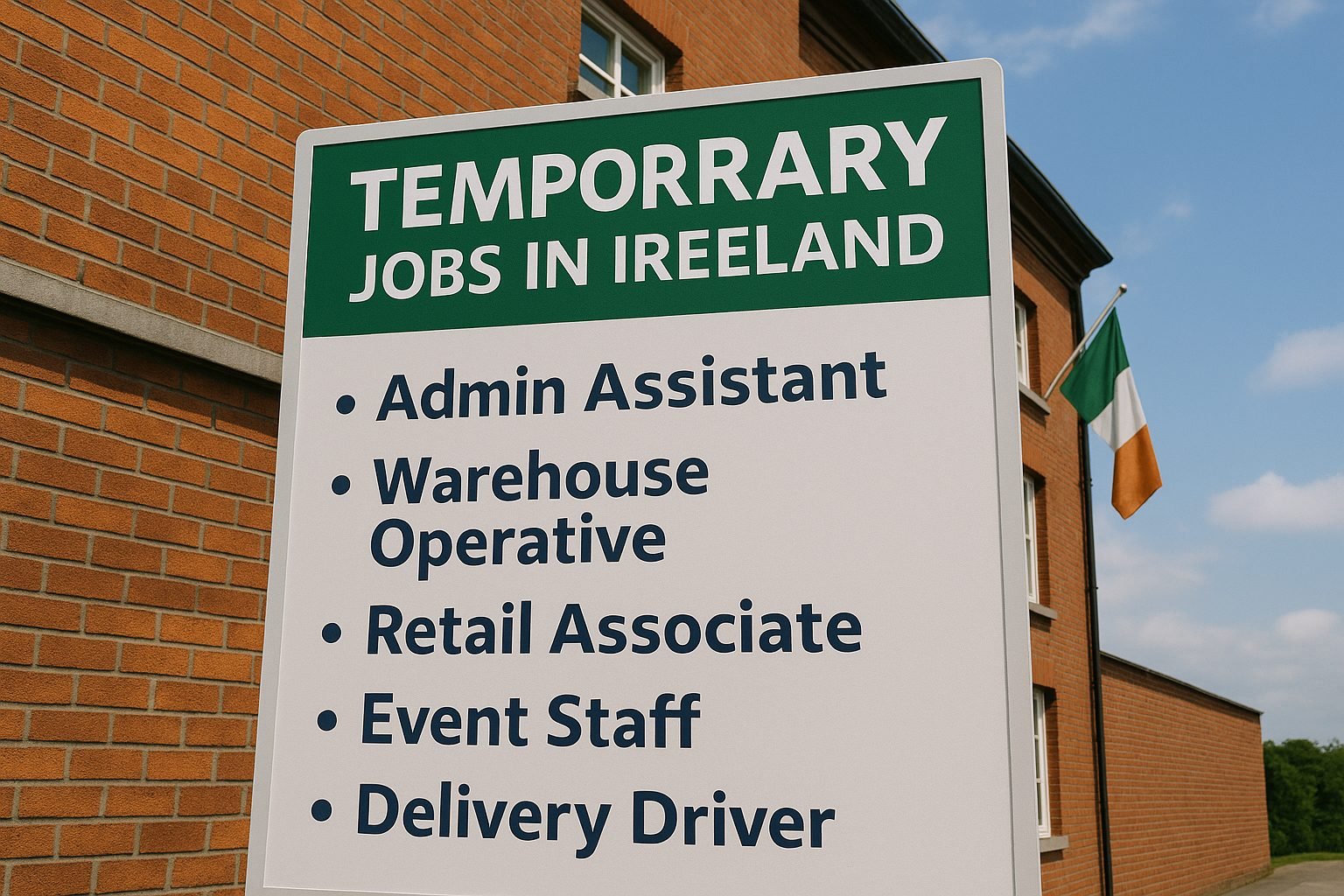Introduction — Why Temporary Jobs in Ireland is worth considering?
Temporary work (temps, seasonal roles, fixed-term contracts and agency placements) is a fast route to extra money, new skills and networks — whether you’re a student, returning to work, taking a career detour, or creating a side income. In Ireland’s evolving labor market, employers use temporary staff to cover peak seasons (tourism, retail), project work (tech, events), and gaps caused by growth in logistics, healthcare and hospitality. This guide explains what to expect in 2026: pay, worker rights, high-demand sectors, where to apply, tax and social-welfare basics, and how to turn temporary gigs into long-term opportunities.
What counts as temporary jobs in Ireland?
Temporary jobs include:
-
Agency placements (you’re employed by a recruitment agency and assigned to a client).
-
Fixed-term contracts with a clear end date.
-
Casual/seasonal roles (summer hospitality, farm work, festival/event staff).
-
Short-term contract or freelance gigs that fill specific needs.
Pay & legal rights you must know
Minimum pay — the 2025/2026 baseline
From 1 January 2025 the Irish national minimum wage for adults (20+) is €13.50 per hour. Lower statutory percentages apply for workers under 20. This is the legal baseline employers must meet where the national minimum wage applies.
Agency workers and equal treatment
If you’re an agency worker you’re protected under Irish law: agency workers should receive equal treatment with directly hired staff in pay, working time and rest from day one of an assignment. The Protection of Employees (Temporary Agency Work) Act and related workplace guidance outline these protections. Always check your agency contract and ask for the client-role rate breakdown.
Predictable conditions & banned zero-hour abuse
Recent employment law reforms require greater transparency and ban many exploitative zero hour practices; look for written terms, minimum payment guarantees, and clear start/end dates. Citizens Information and WRC guidance can help you check your rights if something seems off.
Where are the jobs? Top sectors hiring for temporary jobs in Ireland
Ireland’s labor demand is concentrated in a few sectors that reliably hire temporary workers:
-
Hospitality & Tourism — peak during summers and festivals; front-of-house, bar staff, housekeeping, event crew. Tourism remains a major source of summer/seasonal temp roles.
-
Retail & Customer Service — extra staff at key retail periods (back-to-school, Christmas, sales). Online retail growth also increases warehouse and fulfilment temp roles.
-
Agriculture & Seasonal Farm Work — harvest-based, especially in rural counties. These are often short bursts but can pay well if rates reflect piecework/skill.
-
Logistics & Warehousing — e-commerce growth fuels temp picker/packer and driver roles. These are often posted through recruitment agencies and job boards.
-
Healthcare & Care-sector — temporary nursing and care assistants to cover leave or spikes in demand; typically requires appropriate certification and registration.
-
Events & Festivals — event crew, ticketing, stewarding during summer concert & festival season.
-
Tech & Project Contracting — temporary jobs and contract roles for testing, QA, short projects or internships — higher pay but may require skills/portfolio.
How to find reputable temporary jobs (practical sources & tips)
-
Recruitment agencies / temp agencies — register with several reputable agencies (national and specialist). Agencies like FRS, Staffline, Hall Recruitment and others handle large volumes of temporary hires. Check agency reviews and ask about pay rates, statutory deductions and assignment length.
-
Job boards — IrishJobs.ie, Indeed, LinkedIn and local portals (e.g., PartTime.ie) have filters for temporary/seasonal roles. Set alerts with keywords like “temporary”, “seasonal”, “fixed term”.
-
Company websites — large hotels, event companies, fulfilment centers and farms often post seasonal vacancies directly.
-
University career services & internship portals — great for short-term placements and graduate projects.
-
Local Facebook groups & community boards — for hyper-local gigs (market stalls, gardening, babysitting) — but vet these carefully to avoid scams.
Practical checklist before you accept a temp role
-
Confirm hourly/daily rate, pay frequency and overtime rules. (Is the quoted rate gross or net?)
-
Get written confirmation of start/end dates, expected hours and who your employer technically is (agency or the client).
-
Ask about induction, PPE (if needed), and supervision.
-
Understand tax (PPS number) and whether you’ll be PAYE-deducted or self-employed (correct classification matters).
-
Keep copies of pay slips and your contract; these are important for rights claims.
Tax, social welfare and admin basics for temps in Ireland
-
PPS number & PAYE — you need a PPS number for lawful employment. Most temps are paid under PAYE with tax, USC and PRSI deducted at source.
-
Self-employed temps — some short-term contractors operate as self-employed. This has different tax and PRSI consequences and usually requires invoices. If in doubt, check guidance on Revenue.ie.
-
Benefits & jobseeker interactions — temporary earnings can affect social welfare payments; check with the relevant department before starting work. (If you are receiving supports, report earnings — not doing so can lead to overpayment penalties.)
(For specific tax rules and the interplay between temporary earnings and means-tested supports, consult Revenue and Citizens Information or an accountant.)
How to succeed quickly in temporary jobs (convert temp → perm)
Temporary work is often an audition for permanent roles. Maximize conversion chances by:
-
Being punctual, flexible and presentable.
-
Learning the company’s systems fast; ask smart questions rather than waiting to be shown everything.
-
Volunteering for extra shifts when business needs spike (without burning out).
-
Building relationships with hiring managers — ask about future openings and your performance feedback.
-
Keep a record of measurable wins (e.g., “reduced check-in time by X%”, “completed training for system Y”).
CV and interview tips for temporary roles
-
CV: keep a concise one-page CV with a short “temp profile” summary (availability, right to work, top skills). Highlight short-term achievements and ability to adapt.
-
Cover note: for seasonal roles, mention availability windows (e.g., “Available June–August, evenings & weekends”).
-
Interview: be ready to give examples of rapid learning, teamwork, flexibility and reliability. Explain your immediate availability and any relevant certifications (bar training, manual handling, Garda vetting for care roles).
Safety, scams and red flags to avoid
-
Never pay an agency to get a job. Reputable agencies do not charge jobseekers.
-
Vague job descriptions and no contact details — ask for detailed role info before accepting.
-
Cash-only, off-books offers — these risk no pay slips, no rights and tax problems.
-
No contract or pay slips — insist on written confirmation and a pay slip — these are your proof of employment.
Real-world examples of temp roles to expect in 2026 (quick ideas)
-
Summer hotel receptionist / bar staff (peak May–Sept).
-
Warehouse picker/packer (ongoing, part-time shifts).
-
Event stewarding and box office for festivals.
-
Retail sales assistant for seasonal peaks.
-
Temporary administrative support for accountancy or HR firms during busy periods.
-
Short IT testing or QA contracts for tech companies.
Frequently Asked Questions (FAQ)
Q: Will temporary jobs pay the same as permanent work?
A: Not always. Some temps get the same hourly rate; others earn less but have flexible hours. Agency law requires equal treatment for agency workers in pay and conditions in many circumstances — confirm with your agency. Workplace Relations Commission
Q: Can I be on several temp assignments at once?
A: Possibly, but check client exclusivity clauses, working-time limits and fatigue risks. Keeping good records helps with tax and rights.
Q: Do temps get holiday pay?
A: Yes — holiday entitlement exists; how it’s handled (rolled up in pay or paid separately) should be in your contract.
Q: How can students best use temporary jobs?
A: Students can priorities flexible hours, gain transferable skills (customer service, logistics), and network for future part-time/graduate roles. Part-time/seasonal job portals are particularly useful.
Final thoughts — playing the long game with temporary jobs. (Check out our linkedin page)

Temporary jobs in Ireland can be more than a stopgap: they’re a launchpad. With protections in place (minimum wage law, agency worker rights, predictable-work regulations), temps can earn fair pay while acquiring skills, references and sometimes permanent placements. Treat each assignment as a micro-project — learn fast, demonstrate reliability and keep an eye on the law so you get what you’re owed.








